University Company Law Assignment: Breach of Duty and Remedies
VerifiedAdded on 2022/11/09
|5
|1201
|338
Homework Assignment
AI Summary
This assignment delves into the intricacies of company law, specifically focusing on the duties of directors and the consequences of breaching those duties. The case study revolves around a clothing company facing financial difficulties, with Alice, the sole director, struggling to manage the business amidst personal health issues and the pressures of the Australian Taxation Office. The analysis examines the roles of Alice, her daughter Libby (appointed as director), and Peggy (the accountant), in the context of insolvent trading and the potential breaches of Section 588G of the Corporations Act 2001 (Cth). The assignment explores the available defenses under Section 588H, considering Alice's illness and Libby's actions. Furthermore, it outlines the powers of the liquidator to recover debts from directors and the statutory remedies applicable in cases of breach of duty. The assignment concludes that the liquidator can take actions against Alice and Libby, and statutory remedies would be available if there has been a breach of duty.
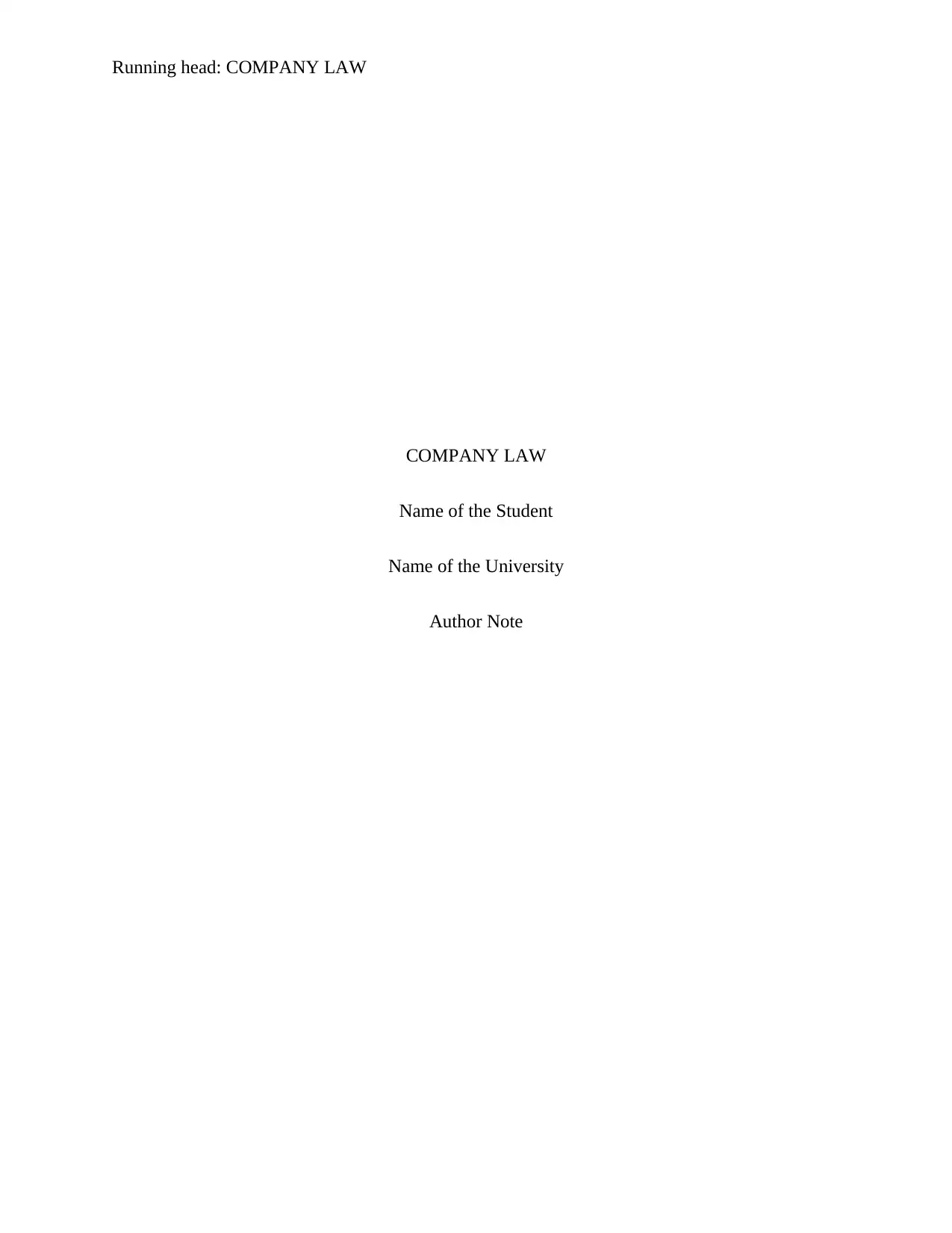
Running head: COMPANY LAW
COMPANY LAW
Name of the Student
Name of the University
Author Note
COMPANY LAW
Name of the Student
Name of the University
Author Note
Paraphrase This Document
Need a fresh take? Get an instant paraphrase of this document with our AI Paraphraser
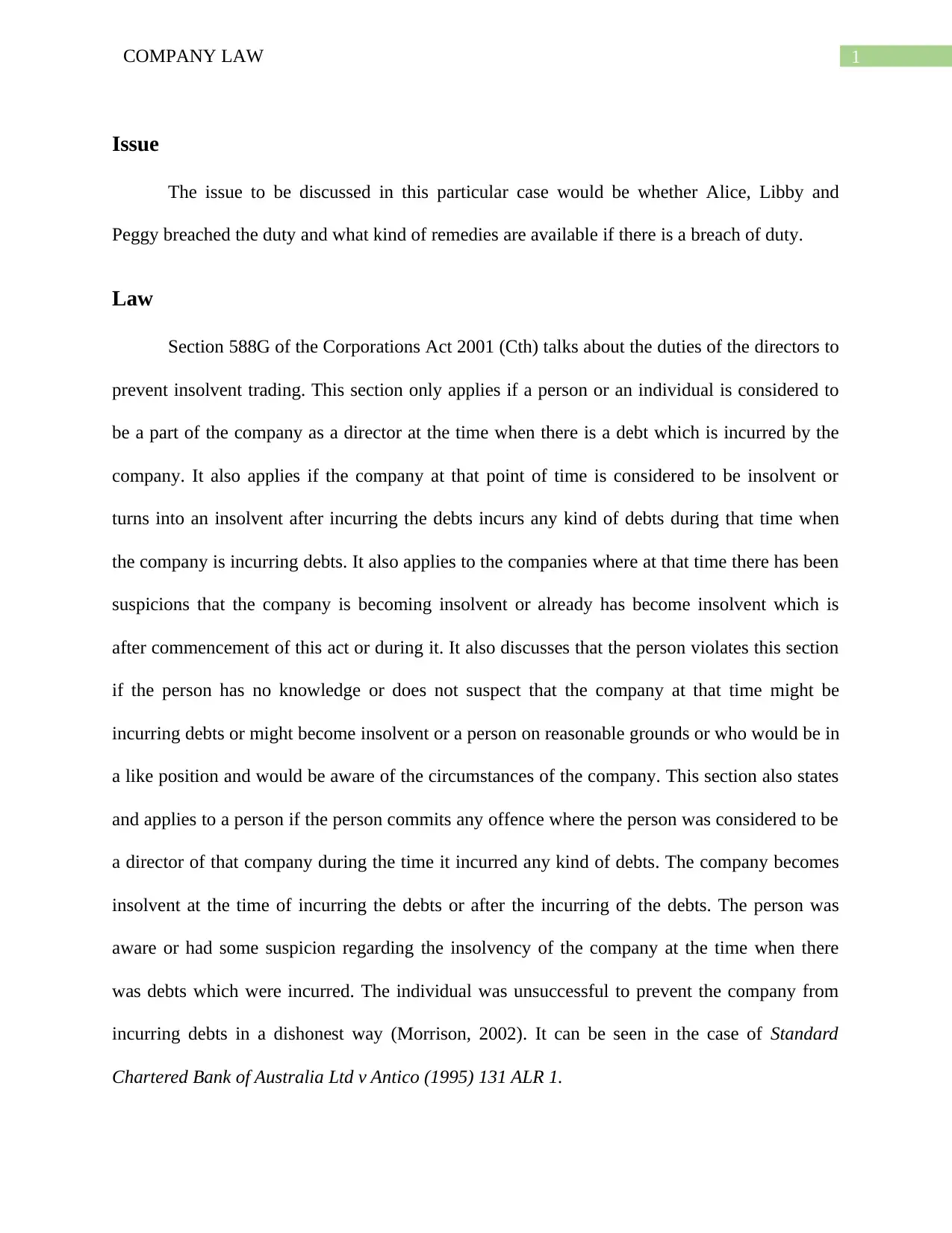
1COMPANY LAW
Issue
The issue to be discussed in this particular case would be whether Alice, Libby and
Peggy breached the duty and what kind of remedies are available if there is a breach of duty.
Law
Section 588G of the Corporations Act 2001 (Cth) talks about the duties of the directors to
prevent insolvent trading. This section only applies if a person or an individual is considered to
be a part of the company as a director at the time when there is a debt which is incurred by the
company. It also applies if the company at that point of time is considered to be insolvent or
turns into an insolvent after incurring the debts incurs any kind of debts during that time when
the company is incurring debts. It also applies to the companies where at that time there has been
suspicions that the company is becoming insolvent or already has become insolvent which is
after commencement of this act or during it. It also discusses that the person violates this section
if the person has no knowledge or does not suspect that the company at that time might be
incurring debts or might become insolvent or a person on reasonable grounds or who would be in
a like position and would be aware of the circumstances of the company. This section also states
and applies to a person if the person commits any offence where the person was considered to be
a director of that company during the time it incurred any kind of debts. The company becomes
insolvent at the time of incurring the debts or after the incurring of the debts. The person was
aware or had some suspicion regarding the insolvency of the company at the time when there
was debts which were incurred. The individual was unsuccessful to prevent the company from
incurring debts in a dishonest way (Morrison, 2002). It can be seen in the case of Standard
Chartered Bank of Australia Ltd v Antico (1995) 131 ALR 1.
Issue
The issue to be discussed in this particular case would be whether Alice, Libby and
Peggy breached the duty and what kind of remedies are available if there is a breach of duty.
Law
Section 588G of the Corporations Act 2001 (Cth) talks about the duties of the directors to
prevent insolvent trading. This section only applies if a person or an individual is considered to
be a part of the company as a director at the time when there is a debt which is incurred by the
company. It also applies if the company at that point of time is considered to be insolvent or
turns into an insolvent after incurring the debts incurs any kind of debts during that time when
the company is incurring debts. It also applies to the companies where at that time there has been
suspicions that the company is becoming insolvent or already has become insolvent which is
after commencement of this act or during it. It also discusses that the person violates this section
if the person has no knowledge or does not suspect that the company at that time might be
incurring debts or might become insolvent or a person on reasonable grounds or who would be in
a like position and would be aware of the circumstances of the company. This section also states
and applies to a person if the person commits any offence where the person was considered to be
a director of that company during the time it incurred any kind of debts. The company becomes
insolvent at the time of incurring the debts or after the incurring of the debts. The person was
aware or had some suspicion regarding the insolvency of the company at the time when there
was debts which were incurred. The individual was unsuccessful to prevent the company from
incurring debts in a dishonest way (Morrison, 2002). It can be seen in the case of Standard
Chartered Bank of Australia Ltd v Antico (1995) 131 ALR 1.
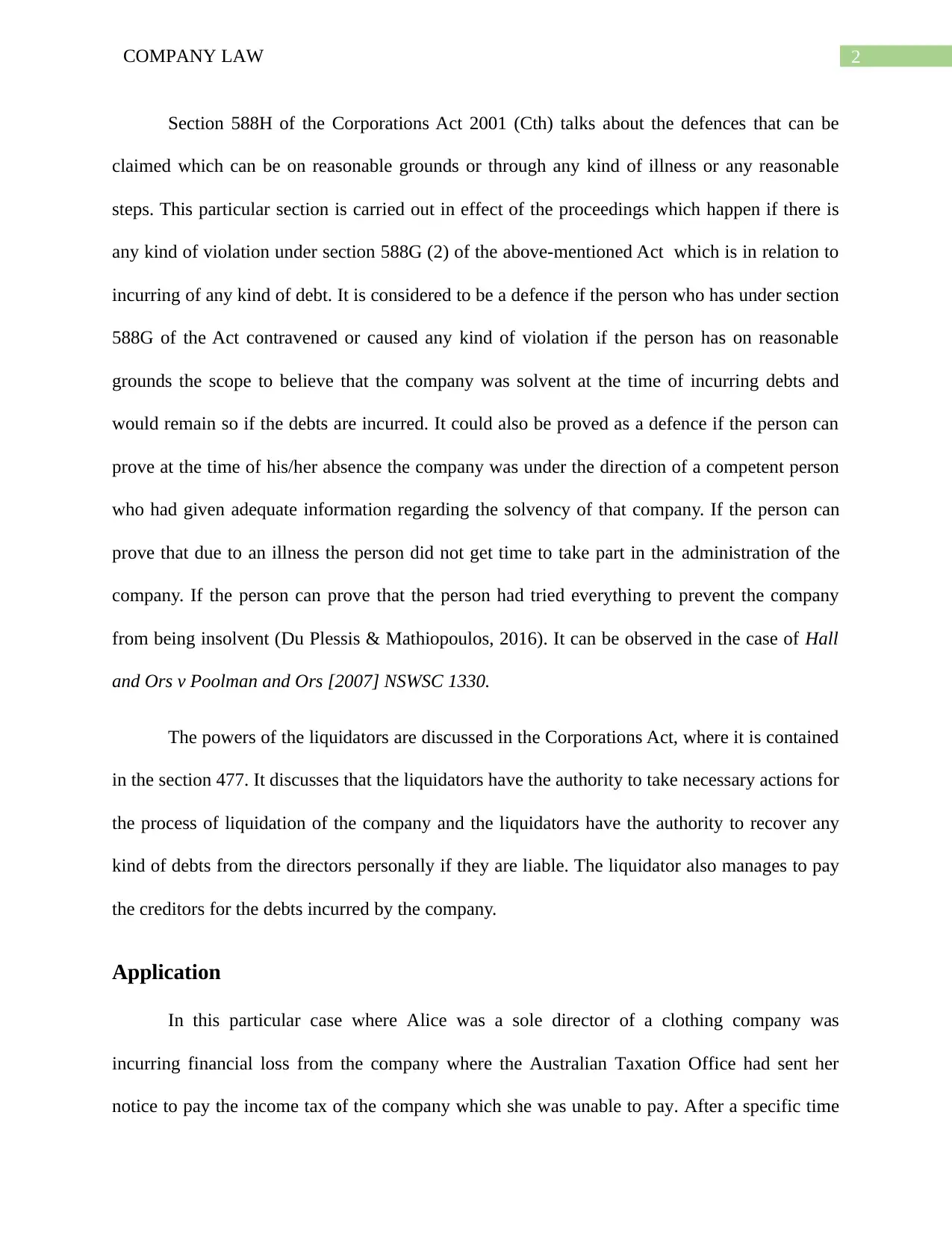
2COMPANY LAW
Section 588H of the Corporations Act 2001 (Cth) talks about the defences that can be
claimed which can be on reasonable grounds or through any kind of illness or any reasonable
steps. This particular section is carried out in effect of the proceedings which happen if there is
any kind of violation under section 588G (2) of the above-mentioned Act which is in relation to
incurring of any kind of debt. It is considered to be a defence if the person who has under section
588G of the Act contravened or caused any kind of violation if the person has on reasonable
grounds the scope to believe that the company was solvent at the time of incurring debts and
would remain so if the debts are incurred. It could also be proved as a defence if the person can
prove at the time of his/her absence the company was under the direction of a competent person
who had given adequate information regarding the solvency of that company. If the person can
prove that due to an illness the person did not get time to take part in the administration of the
company. If the person can prove that the person had tried everything to prevent the company
from being insolvent (Du Plessis & Mathiopoulos, 2016). It can be observed in the case of Hall
and Ors v Poolman and Ors [2007] NSWSC 1330.
The powers of the liquidators are discussed in the Corporations Act, where it is contained
in the section 477. It discusses that the liquidators have the authority to take necessary actions for
the process of liquidation of the company and the liquidators have the authority to recover any
kind of debts from the directors personally if they are liable. The liquidator also manages to pay
the creditors for the debts incurred by the company.
Application
In this particular case where Alice was a sole director of a clothing company was
incurring financial loss from the company where the Australian Taxation Office had sent her
notice to pay the income tax of the company which she was unable to pay. After a specific time
Section 588H of the Corporations Act 2001 (Cth) talks about the defences that can be
claimed which can be on reasonable grounds or through any kind of illness or any reasonable
steps. This particular section is carried out in effect of the proceedings which happen if there is
any kind of violation under section 588G (2) of the above-mentioned Act which is in relation to
incurring of any kind of debt. It is considered to be a defence if the person who has under section
588G of the Act contravened or caused any kind of violation if the person has on reasonable
grounds the scope to believe that the company was solvent at the time of incurring debts and
would remain so if the debts are incurred. It could also be proved as a defence if the person can
prove at the time of his/her absence the company was under the direction of a competent person
who had given adequate information regarding the solvency of that company. If the person can
prove that due to an illness the person did not get time to take part in the administration of the
company. If the person can prove that the person had tried everything to prevent the company
from being insolvent (Du Plessis & Mathiopoulos, 2016). It can be observed in the case of Hall
and Ors v Poolman and Ors [2007] NSWSC 1330.
The powers of the liquidators are discussed in the Corporations Act, where it is contained
in the section 477. It discusses that the liquidators have the authority to take necessary actions for
the process of liquidation of the company and the liquidators have the authority to recover any
kind of debts from the directors personally if they are liable. The liquidator also manages to pay
the creditors for the debts incurred by the company.
Application
In this particular case where Alice was a sole director of a clothing company was
incurring financial loss from the company where the Australian Taxation Office had sent her
notice to pay the income tax of the company which she was unable to pay. After a specific time
⊘ This is a preview!⊘
Do you want full access?
Subscribe today to unlock all pages.

Trusted by 1+ million students worldwide
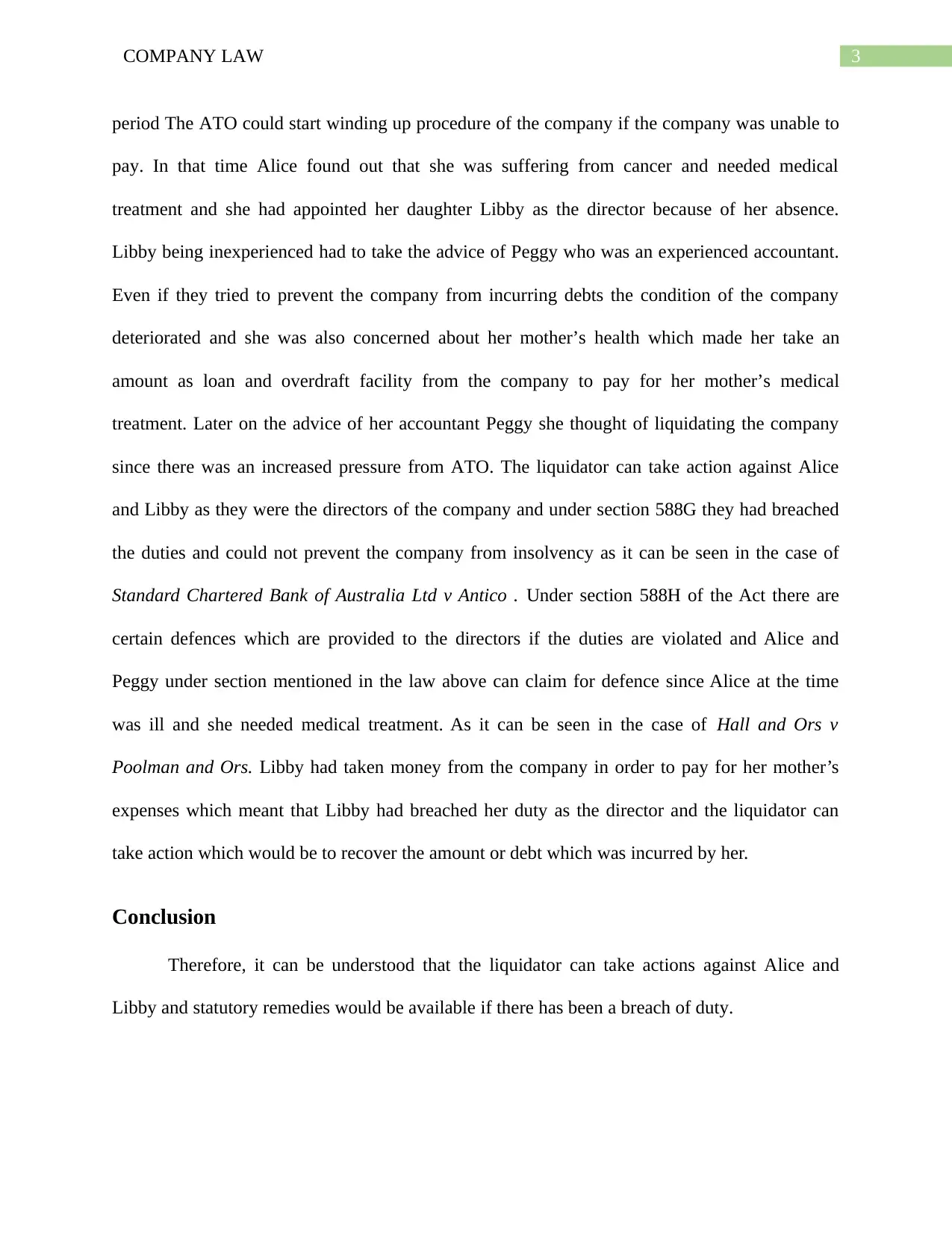
3COMPANY LAW
period The ATO could start winding up procedure of the company if the company was unable to
pay. In that time Alice found out that she was suffering from cancer and needed medical
treatment and she had appointed her daughter Libby as the director because of her absence.
Libby being inexperienced had to take the advice of Peggy who was an experienced accountant.
Even if they tried to prevent the company from incurring debts the condition of the company
deteriorated and she was also concerned about her mother’s health which made her take an
amount as loan and overdraft facility from the company to pay for her mother’s medical
treatment. Later on the advice of her accountant Peggy she thought of liquidating the company
since there was an increased pressure from ATO. The liquidator can take action against Alice
and Libby as they were the directors of the company and under section 588G they had breached
the duties and could not prevent the company from insolvency as it can be seen in the case of
Standard Chartered Bank of Australia Ltd v Antico . Under section 588H of the Act there are
certain defences which are provided to the directors if the duties are violated and Alice and
Peggy under section mentioned in the law above can claim for defence since Alice at the time
was ill and she needed medical treatment. As it can be seen in the case of Hall and Ors v
Poolman and Ors. Libby had taken money from the company in order to pay for her mother’s
expenses which meant that Libby had breached her duty as the director and the liquidator can
take action which would be to recover the amount or debt which was incurred by her.
Conclusion
Therefore, it can be understood that the liquidator can take actions against Alice and
Libby and statutory remedies would be available if there has been a breach of duty.
period The ATO could start winding up procedure of the company if the company was unable to
pay. In that time Alice found out that she was suffering from cancer and needed medical
treatment and she had appointed her daughter Libby as the director because of her absence.
Libby being inexperienced had to take the advice of Peggy who was an experienced accountant.
Even if they tried to prevent the company from incurring debts the condition of the company
deteriorated and she was also concerned about her mother’s health which made her take an
amount as loan and overdraft facility from the company to pay for her mother’s medical
treatment. Later on the advice of her accountant Peggy she thought of liquidating the company
since there was an increased pressure from ATO. The liquidator can take action against Alice
and Libby as they were the directors of the company and under section 588G they had breached
the duties and could not prevent the company from insolvency as it can be seen in the case of
Standard Chartered Bank of Australia Ltd v Antico . Under section 588H of the Act there are
certain defences which are provided to the directors if the duties are violated and Alice and
Peggy under section mentioned in the law above can claim for defence since Alice at the time
was ill and she needed medical treatment. As it can be seen in the case of Hall and Ors v
Poolman and Ors. Libby had taken money from the company in order to pay for her mother’s
expenses which meant that Libby had breached her duty as the director and the liquidator can
take action which would be to recover the amount or debt which was incurred by her.
Conclusion
Therefore, it can be understood that the liquidator can take actions against Alice and
Libby and statutory remedies would be available if there has been a breach of duty.
Paraphrase This Document
Need a fresh take? Get an instant paraphrase of this document with our AI Paraphraser
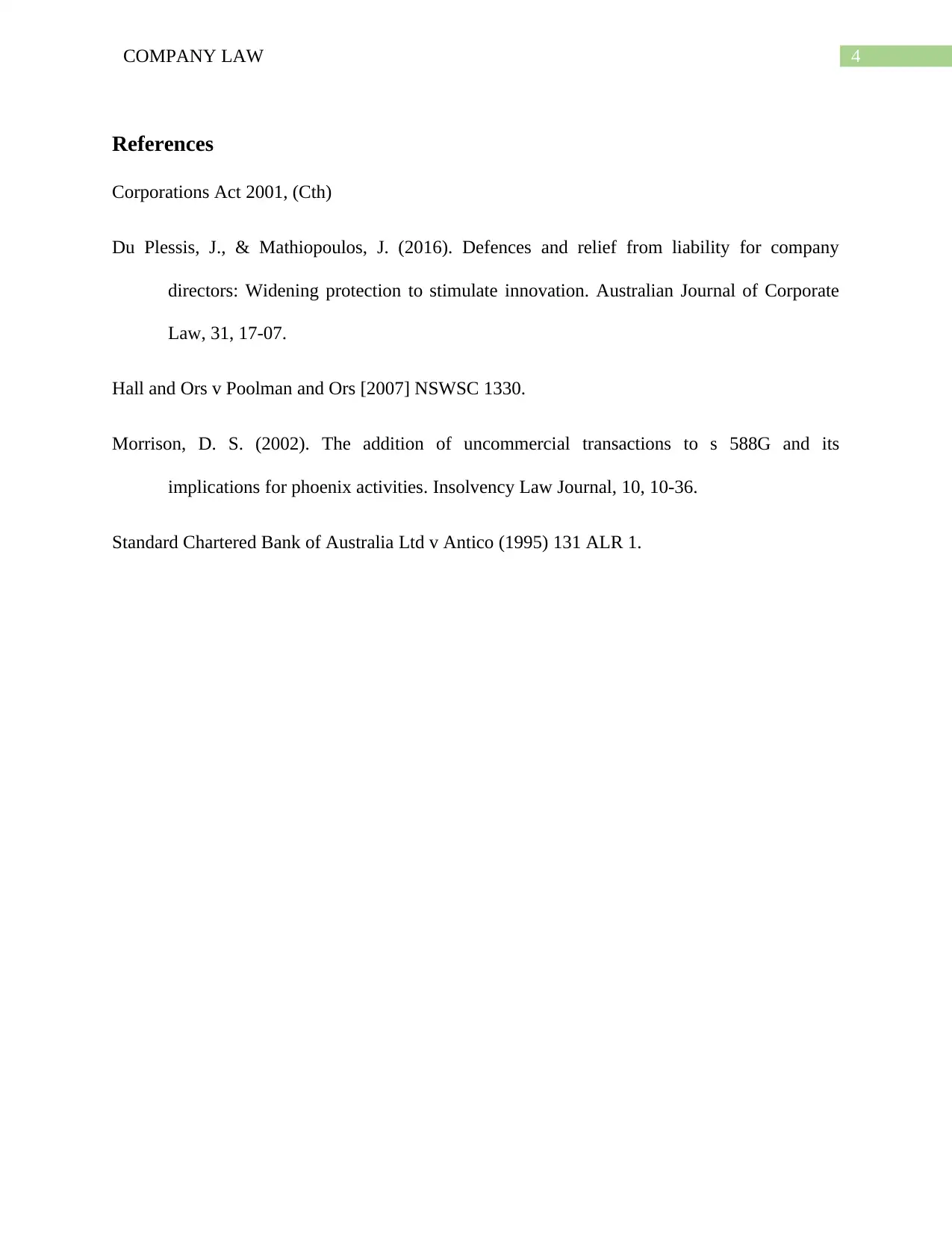
4COMPANY LAW
References
Corporations Act 2001, (Cth)
Du Plessis, J., & Mathiopoulos, J. (2016). Defences and relief from liability for company
directors: Widening protection to stimulate innovation. Australian Journal of Corporate
Law, 31, 17-07.
Hall and Ors v Poolman and Ors [2007] NSWSC 1330.
Morrison, D. S. (2002). The addition of uncommercial transactions to s 588G and its
implications for phoenix activities. Insolvency Law Journal, 10, 10-36.
Standard Chartered Bank of Australia Ltd v Antico (1995) 131 ALR 1.
References
Corporations Act 2001, (Cth)
Du Plessis, J., & Mathiopoulos, J. (2016). Defences and relief from liability for company
directors: Widening protection to stimulate innovation. Australian Journal of Corporate
Law, 31, 17-07.
Hall and Ors v Poolman and Ors [2007] NSWSC 1330.
Morrison, D. S. (2002). The addition of uncommercial transactions to s 588G and its
implications for phoenix activities. Insolvency Law Journal, 10, 10-36.
Standard Chartered Bank of Australia Ltd v Antico (1995) 131 ALR 1.
1 out of 5
Related Documents
Your All-in-One AI-Powered Toolkit for Academic Success.
+13062052269
info@desklib.com
Available 24*7 on WhatsApp / Email
![[object Object]](/_next/static/media/star-bottom.7253800d.svg)
Unlock your academic potential
Copyright © 2020–2026 A2Z Services. All Rights Reserved. Developed and managed by ZUCOL.





